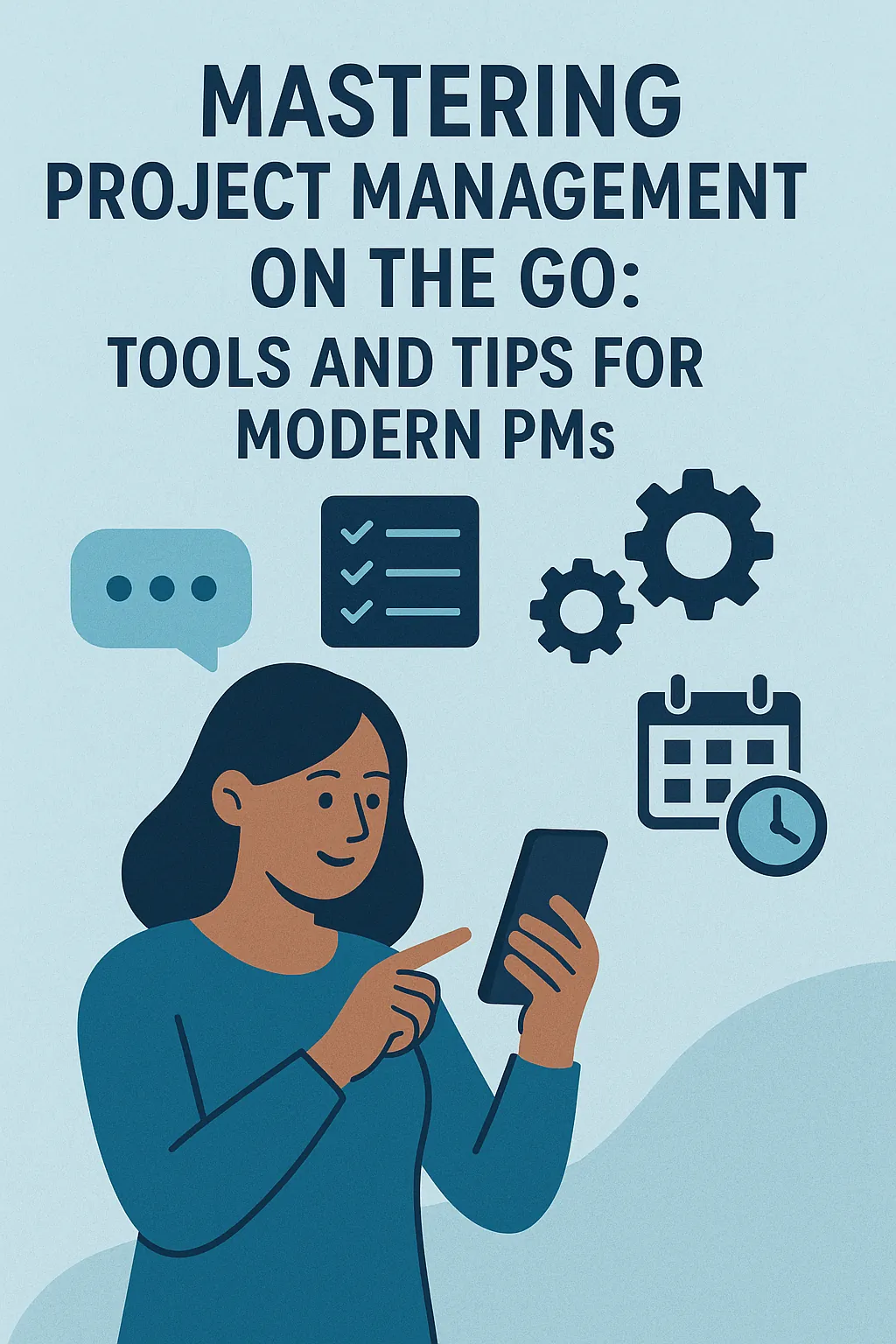Introduction to On-the-Go Project Management
The ability to manage projects from anywhere has become increasingly vital. On-the-go project management refers to the practice of utilizing mobile tools and applications that allow project managers and team leaders to oversee tasks, communicate with team members, and track progress while away from a traditional office setting. This approach not only enhances productivity but also fosters a culture of flexibility and responsiveness.
Definition of On-the-Go Project Management
On-the-go project management encompasses the use of mobile applications and cloud-based tools that enable project managers to access project information, collaborate with team members, and make decisions in real-time, regardless of their physical location. This shift towards mobile management is driven by the need for instant access to project data and the ability to respond swiftly to changes and challenges as they arise.
Importance of Flexibility and Mobility in Project Management
The significance of flexibility and mobility in project management cannot be overstated. As teams become more dispersed and remote work becomes the norm, project managers must adapt to ensure that projects remain on track. Key benefits of on-the-go project management include:
- Enhanced Communication: Mobile tools facilitate seamless communication among team members, allowing for quick updates and feedback, which is crucial for maintaining momentum in projects.
- Real-Time Updates: Project managers can monitor progress and make necessary adjustments on the fly, ensuring that any issues are addressed promptly.
- Increased Productivity: With the ability to manage tasks from anywhere, project managers can utilize downtime effectively, whether they are commuting, traveling, or working from home.
Overview of Trends in Remote Work and Digital Collaboration
The rise of remote work has transformed the landscape of project management. Recent trends indicate a significant shift towards digital collaboration tools that support remote teams. Some notable trends include:
- Adoption of Cloud-Based Tools: Tools like Trello, Asana, and Microsoft Teams have gained popularity, allowing teams to collaborate in real-time and access project information from any device.
- Integration of Mobile Applications: Many project management software solutions now offer mobile applications, enabling project managers to stay connected and productive while on the go.
- Focus on Work-Life Balance: As remote work becomes more prevalent, organizations are recognizing the importance of flexibility in work arrangements, which in turn supports employee satisfaction and retention.
Essential Tools for On-the-Go PMs
Project managers (PMs) and team leaders must be equipped with the right tools to manage projects effectively from anywhere. The rise of remote work and the need for flexibility have made mobile project management software and collaboration tools essential. Here’s an overview of key tools that empower PMs to work efficiently on the go.
1. Project Management Software with Mobile Capabilities
Modern project management software often includes mobile applications that allow PMs to oversee projects from their smartphones or tablets. These tools provide essential features such as:
- Task Assignment and Tracking: PMs can assign tasks, set deadlines, and monitor progress in real-time, ensuring that team members stay on track regardless of their location.
- Project Visualization: Many tools offer visual project boards, such as Kanban or Gantt charts, which help PMs quickly assess project status and make informed decisions on the go.
- Integration with Other Apps: Mobile project management tools often integrate with other applications, allowing for seamless workflows and data sharing across platforms.
Popular options include Asana, which offers a user-friendly interface for task management, and Trello, known for its visual approach to project organization. Both tools have robust mobile applications that keep PMs connected to their projects anytime, anywhere [1][4].
2. Collaboration Tools for Real-Time Communication and Feedback
Effective communication is crucial for project success, especially when teams are dispersed. Collaboration tools facilitate real-time communication and feedback, enabling PMs to maintain team cohesion and productivity. Key features to look for include:
- Instant Messaging: Tools like Slack and Microsoft Teams provide instant messaging capabilities, allowing team members to communicate quickly and share updates without delays.
- Video Conferencing: Platforms such as Zoom and Google Meet enable face-to-face meetings, which can enhance understanding and collaboration among team members.
- Document Sharing and Collaboration: Tools like Google Workspace allow teams to collaborate on documents in real-time, ensuring that everyone has access to the latest information and can contribute effectively.
These collaboration tools not only enhance communication but also foster a sense of community among remote teams, which is vital for maintaining morale and productivity [5][10].
3. Time-Tracking and Productivity Apps
Managing time effectively is a critical aspect of project management, especially when working remotely. Time-tracking and productivity apps help PMs and their teams stay organized and focused on their tasks. Essential features include:
- Time Tracking: Apps like Toggl and Harvest allow users to track the time spent on various tasks, providing insights into productivity and helping to identify areas for improvement.
- Task Management: Tools such as Todoist and Microsoft To Do help PMs create to-do lists, prioritize tasks, and set reminders, ensuring that nothing falls through the cracks.
- Pomodoro Timers: Productivity apps that incorporate the Pomodoro technique can help team members maintain focus and manage their time effectively by breaking work into intervals with short breaks in between.
By utilizing these time-tracking and productivity tools, PMs can ensure that their teams remain efficient and accountable, even when working from different locations [6][8][15].
Choosing the Right Tools for Your Team
The ability to work efficiently from anywhere is crucial. As project managers and team leaders navigate the complexities of remote and hybrid work environments, selecting the right tools becomes paramount. Here are some key considerations to guide you in choosing the best project management tools for your team:
- Assessing Team Size, Project Complexity, and Communication Styles: Understanding the dynamics of your team is the first step in selecting appropriate tools. Consider the size of your team and the complexity of your projects. Larger teams or more complex projects may require robust tools that can handle multiple tasks, timelines, and resources effectively. Additionally, evaluate your team’s communication styles. Tools that facilitate real-time collaboration and communication can enhance productivity and ensure everyone is on the same page, especially in a remote setting [2][9].
- Evaluating User-Friendliness and Mobile Accessibility: The usability of project management tools is critical for ensuring that all team members can engage with the software effectively. Look for tools that offer intuitive interfaces and straightforward navigation. Mobile accessibility is also essential, as it allows team members to manage tasks and communicate on the go. This flexibility can significantly improve responsiveness and project tracking, making it easier for teams to adapt to changing circumstances [3][10].
- Consideration of Integrations with Existing Software: When selecting project management tools, consider how well they integrate with the software your team is already using. Seamless integration can streamline workflows and reduce the need for switching between different applications. Tools that connect with existing platforms, such as email clients, document sharing services, and communication apps, can enhance overall efficiency and ensure that all project-related information is easily accessible [4][6].
By carefully assessing these factors, project managers can choose tools that not only meet their team’s specific needs but also empower them to work effectively from anywhere. The right tools can transform project management into a more organized, collaborative, and productive process, ultimately leading to successful project outcomes.
Best Practices for Managing Projects on the Go
Project managers (PMs) and team leaders must adapt to managing projects from various locations. This flexibility can enhance productivity, but it also requires a strategic approach to ensure that projects remain on track. Here are some best practices to help PMs effectively manage projects on the go:
1. Establish Clear Communication Protocols
Effective communication is the backbone of successful project management, especially when teams are dispersed. To facilitate this:
- Choose the Right Tools: Utilize communication platforms like Slack, Microsoft Teams, or Zoom to ensure that team members can connect easily, regardless of their location. These tools support instant messaging, video calls, and file sharing, which are essential for real-time collaboration [2].
- Set Communication Guidelines: Define how and when team members should communicate. For instance, establish regular check-ins or updates to keep everyone informed about project developments. This helps in minimizing misunderstandings and ensures that all team members are aligned with project goals [10].
2. Set Realistic Deadlines and Expectations
When managing projects remotely, it is crucial to set achievable deadlines and clear expectations to maintain team morale and productivity:
- Assess Team Capacity: Understand the strengths and weaknesses of your team members to allocate tasks effectively. This can help in setting deadlines that are realistic and considerate of individual workloads [6].
- Prioritize Tasks: Use project management tools like Trello, Asana, or Monday.com to prioritize tasks based on urgency and importance. This not only helps in managing time effectively but also ensures that team members are focused on the right activities [3].
3. Regularly Update Project Progress and Maintain Accountability
Keeping track of project progress is vital for ensuring that deadlines are met and that the project stays within scope:
- Implement Progress Tracking Tools: Utilize tools such as Jira or ClickUp to monitor project milestones and deadlines. These platforms allow for real-time updates and can help in identifying potential bottlenecks early on [9].
- Encourage Accountability: Foster a culture of accountability by assigning clear roles and responsibilities. Regularly review progress in team meetings and encourage team members to share updates on their tasks. This not only keeps everyone accountable but also promotes transparency within the team [11].
By implementing these best practices, project managers can enhance their productivity and effectiveness while managing projects remotely. The key lies in leveraging the right tools and fostering a collaborative environment that supports clear communication, realistic planning, and accountability.
Challenges and Solutions in On-the-Go Project Management
Project managers (PMs) often find themselves needing to manage projects from various locations, whether working remotely, traveling, or collaborating with global teams. This flexibility, while beneficial, introduces a unique set of challenges that can impact project success. Below are some common challenges faced by PMs in on-the-go project management, along with effective strategies to overcome them.
Common Challenges
- Communication Barriers:
- Issue: When team members are dispersed across different locations, maintaining clear and consistent communication can be difficult. Misunderstandings may arise, leading to project delays and conflicts.
- Solution: Utilize communication tools such as Slack, Microsoft Teams, or Zoom to facilitate real-time discussions. Establish regular check-ins and updates to ensure everyone is aligned and informed about project developments.
- Time Zone Differences:
- Issue: Coordinating meetings and deadlines across various time zones can create confusion and hinder collaboration.
- Solution: Implement scheduling tools like World Time Buddy or Doodle to find suitable meeting times for all team members. Additionally, consider recording meetings for those who cannot attend live, ensuring that everyone has access to the information shared.
- Resource Availability:
- Issue: Limited access to resources and tools can impede productivity when working remotely or on the go.
- Solution: Leverage cloud-based project management tools such as Trello, Asana, or Monday.com, which allow PMs and team members to access project information and collaborate from anywhere. This ensures that all team members have the resources they need at their fingertips.
- Maintaining Team Morale:
- Issue: Remote work can lead to feelings of isolation among team members, affecting morale and productivity.
- Solution: Foster a positive team culture by encouraging informal interactions through virtual coffee breaks or team-building activities. Recognize individual and team achievements to keep motivation high.
- Adapting to Change:
- Issue: Rapid changes in project scope or requirements can be challenging to manage, especially when teams are not co-located.
- Solution: Embrace agile project management methodologies that promote flexibility and adaptability. Regularly review project goals and adjust plans as necessary to accommodate changes, ensuring that the team remains focused and aligned.
Encouraging Flexibility and Adaptability
Flexibility and adaptability are crucial. PMs should cultivate a mindset that embraces change and encourages team members to do the same. This can be achieved by:
- Promoting Continuous Learning: Encourage team members to engage in professional development opportunities, such as online courses or webinars, to enhance their skills and adapt to new tools and methodologies.
- Implementing Agile Practices: Adopt agile frameworks that allow for iterative progress and regular feedback, enabling teams to pivot quickly in response to changing project needs.
- Utilizing Technology: Invest in mobile-friendly project management tools that facilitate collaboration and communication, ensuring that team members can stay connected and productive regardless of their location.
By addressing these challenges and implementing effective solutions, project managers can master the art of on-the-go project management, leading their teams to success in an increasingly mobile work environment.
Future Trends in Mobile Project Management
As project management continues to evolve, the integration of advanced technologies is reshaping how project managers operate, especially in mobile environments. Here are some key trends and technologies that are set to influence on-the-go project management:
- Emerging Technologies: AI and Machine Learning
The incorporation of artificial intelligence (AI) and machine learning into project management tools is revolutionizing the way project managers make decisions and optimize workflows. These technologies enhance data-driven decision-making, allowing managers to analyze vast amounts of data quickly and efficiently. AI-driven project management software can automate routine tasks, predict project risks, and provide insights that help in making informed decisions, ultimately improving project outcomes and efficiency [1][8]. - Virtual and Augmented Reality for Team Collaboration
Virtual reality (VR) and augmented reality (AR) are emerging as powerful tools for enhancing team collaboration, especially in remote settings. These technologies enable immersive experiences that can facilitate better communication and understanding among team members, regardless of their physical location. For instance, VR can simulate project environments for training or brainstorming sessions, while AR can overlay digital information onto the physical world, aiding in real-time collaboration and problem-solving [1][9]. - Evolution of Remote Project Management Practices
The landscape of remote project management is continuously evolving, driven by the need for flexibility and adaptability in response to changing market conditions. As businesses increasingly embrace remote work, project managers are expected to adopt more agile methodologies that prioritize collaboration and responsiveness. This shift will likely lead to the development of new tools and practices that support seamless communication, task management, and performance tracking, ensuring that teams remain aligned and productive, no matter where they are located [3][10].
Conclusion
Mastering project management on the go has become essential for project managers and team leaders. The ability to manage projects efficiently from anywhere not only enhances productivity but also fosters better collaboration among team members. As we have explored, leveraging the right tools can significantly streamline communication, task management, and overall project execution, allowing project managers to stay connected and informed regardless of their location.
To recap, the importance of mastering project management on the go includes:
- Increased Flexibility: Being able to manage projects from various locations allows for greater adaptability to changing circumstances and team dynamics.
- Enhanced Communication: Utilizing modern communication tools ensures that all team members are on the same page, which is crucial for project success.
- Improved Productivity: With the right project management tools, tasks can be tracked and managed more effectively, leading to timely project completion.
Find out more about Shaun Stoltz https://www.shaunstoltz.com/about/.
This post was written by an AI and reviewed/edited by a human.



